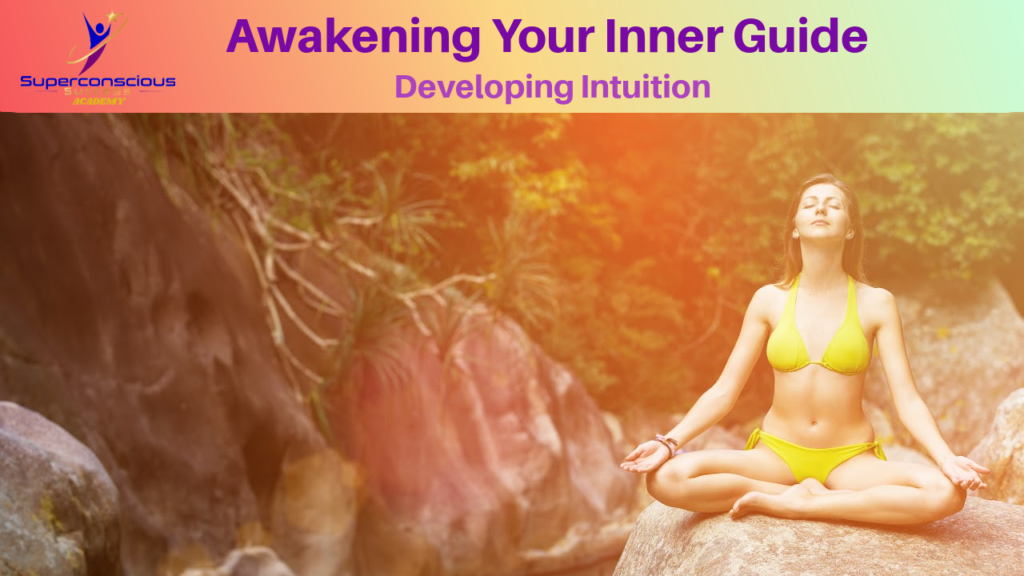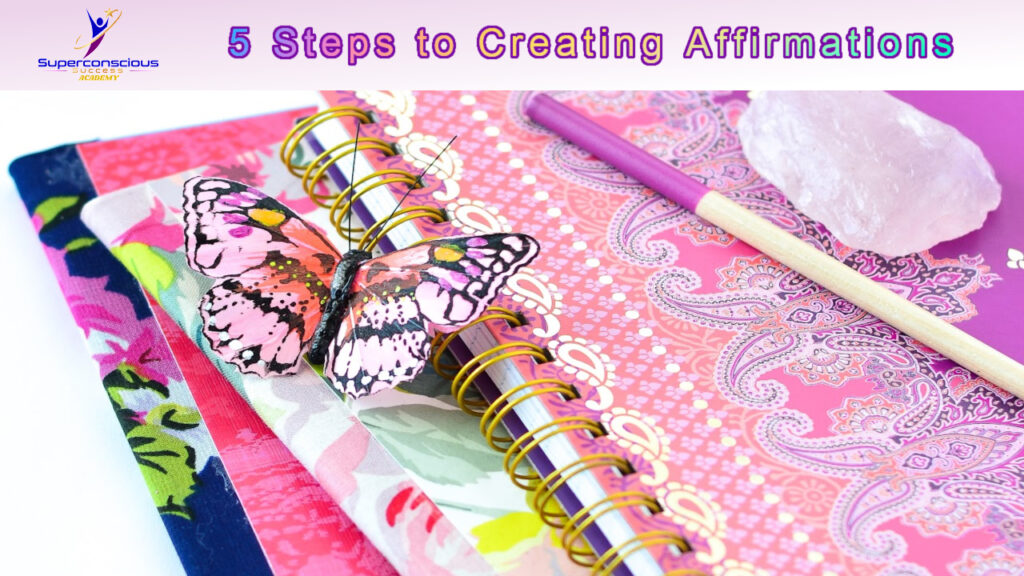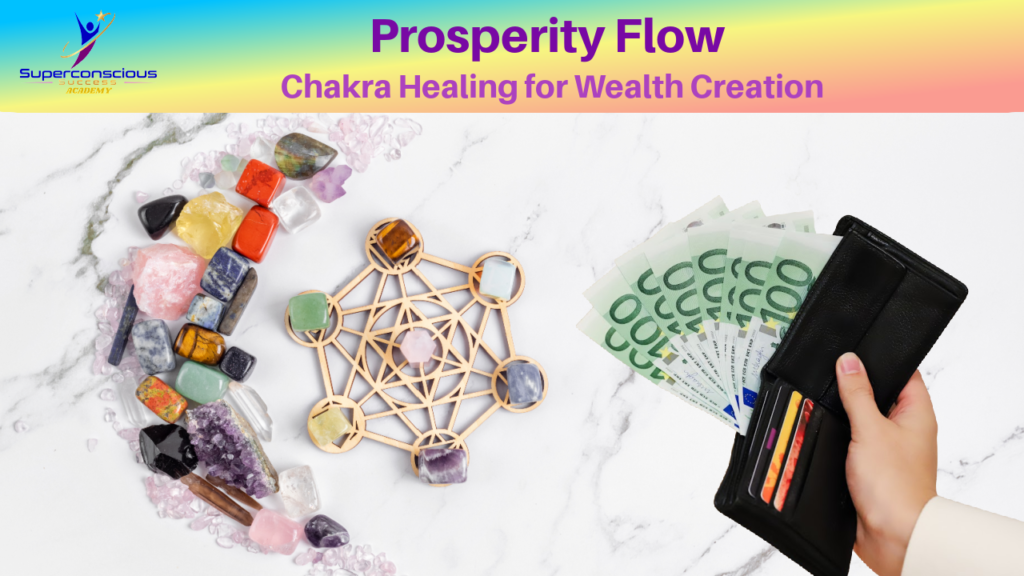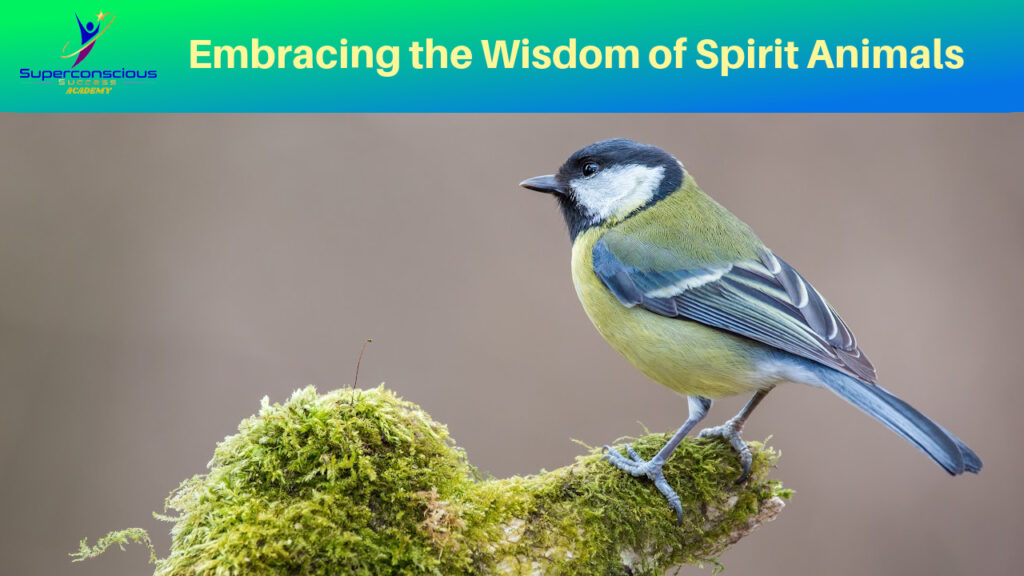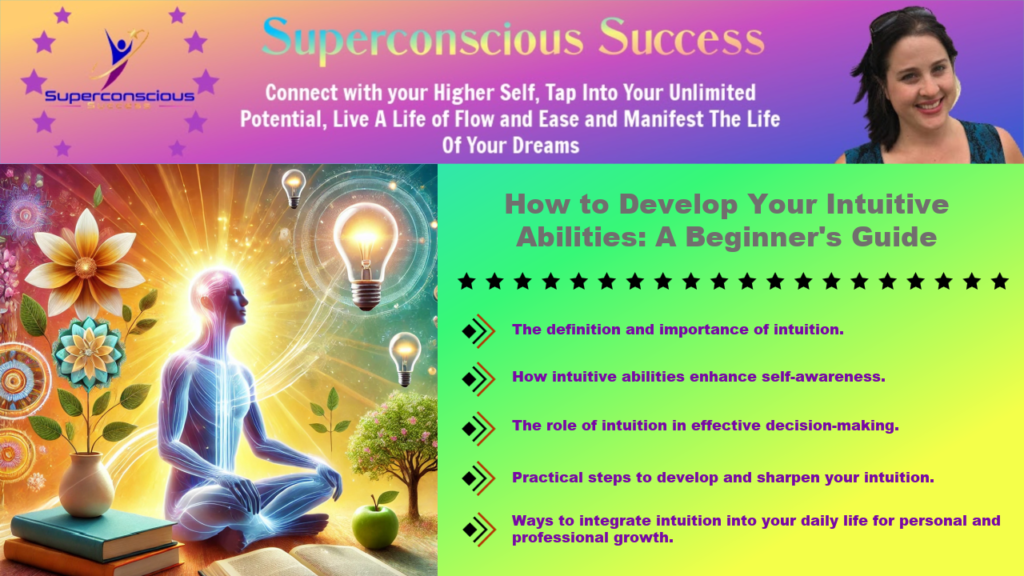
Explore how developing intuition can enhance decision-making, boost creativity, and increase self-awareness. This post offers practical steps and exercises to harness your intuitive abilities. It also shows how to integrate them into your daily life. By doing so, you can create a more fulfilling experience.
Page 1
Page 2
Additional Information
Understanding Intuition: What It Is and Why It Matters
Intuition is that gut feeling or instinctive knowing that comes without conscious reasoning. Unlike analytical thinking, which relies on logic and deliberate thought, intuition is spontaneous and holistic. It manifests as sudden insights or inexplicable senses of knowing. Developing your intuition can profoundly impact various aspects of your life.
Tuning into your intuition significantly enhances self-awareness. As a result, this allows you to better understand your true needs and desires through a deeper connection with your emotions, thoughts, and physical sensations. Consequently, this heightened awareness leads to a more authentic and fulfilling life. Furthermore, intuition greatly improves decision-making. Specifically, it guides you when logic falls short or time is limited. By quickly synthesizing information and drawing from past experiences, intuition helps you make confident choices. In addition, intuitive thinking boosts creativity, sparking innovative ideas and solutions. Ultimately, these insights encourage out-of-the-box thinking and enrich both your personal and professional life.
Practical Steps to Enhance Your Intuition
Developing intuition requires consistent practice and mindfulness. Here are some practical steps to seamlessly incorporate into your daily routine:
Intuition Journal
Starting a daily journal for your intuitive thoughts, feelings, and experiences can be transformative. Spend a few moments each day jotting down your intuitive insights. This creates a valuable record to track and understand your intuition’s nuances. This practice captures spontaneous flashes of insight and helps identify patterns and recurring themes over time.
As you document your intuitive experiences, you’ll differentiate genuine nudges from regular thoughts. This distinction is crucial for trusting your intuition. It also helps you recognize when it’s guiding you. Over time, your journal becomes a rich resource for reflection. It offers insights into how your intuition works and how it can best serve you.
Reviewing your journal entries periodically provides valuable hindsight. You can see how past intuitive feelings correlated with actual outcomes. This reflection strengthens your confidence in your intuitive abilities and helps fine-tune your practice. Whether you’re new to exploring intuition or deepening your understanding, a daily intuition journal is a practical tool for personal growth and self-awareness.
Dream Analysis
Keeping a dream journal by your bed is a powerful way to access your subconscious mind. Dreams reveal our innermost thoughts, emotions, and intuitions, offering insights not always accessible during waking hours. Recording your dreams as soon as you wake up captures fresh details and emotions before they fade.
This practice involves noting the events, emotions, colors, symbols, and significant interactions in your dreams. Over time, you’ll notice recurring symbols, themes, or situations. These patterns can be revealing, representing unresolved issues, hidden fears, or unacknowledged desires. For example, dreaming about water might symbolize emotions, while flying could indicate a desire for freedom.
Reflecting on these elements provides intuitive messages your conscious mind might overlook. They offer guidance, highlight areas for personal growth, or warn of potential pitfalls. By paying attention to these symbols, you gain a deeper understanding of your inner world and the currents shaping your thoughts.
A dream journal also helps you become more attuned to your intuitive abilities. Reviewing entries can reveal correlations between dream symbols and real-life situations. This recognition boosts your confidence in your intuition and helps you interpret future intuitive signals.
In summary, keeping a dream journal is a simple yet profound practice that enhances self-awareness and intuitive understanding. By capturing and reflecting on your dreams, you open a channel to deeper wisdom and insight, guiding you in your daily life.
Mindfulness Practices
Engaging in practices such as meditation, deep breathing, or mindful walking is an excellent way to cultivate mindfulness and enhance your intuitive abilities. These practices help you stay present, grounded, and aware of the subtle cues that your intuition may provide.
Meditation is a powerful tool for developing mindfulness and connecting with your inner self. Setting aside time each day to sit in stillness and focus on your breath can quiet the mental chatter. This quieting of the mind creates a calm and centered state. It helps you become more attuned to the subtle signals of your intuition. As you meditate, you may notice intuitive feelings, images, or thoughts arising spontaneously. By observing these without judgment, you can better understand their meaning and relevance to your life.
Deep breathing exercises are an effective way to cultivate mindfulness and tap into your intuitive senses. Taking slow, deliberate breaths activates the parasympathetic nervous system. This promotes relaxation and reduces stress. This relaxed state is conducive to intuitive insight. It allows you to focus inward and become more aware of your body’s sensations and emotions. Deep breathing can be practiced anywhere and at any time, making it a versatile tool for tuning into your intuition throughout the day.
Mindful walking is a form of meditation in motion that encourages you to stay present and fully engage with your surroundings. As you walk, pay close attention to the sensations in your body, the rhythm of your steps, and the environment around you. By immersing yourself in the experience, you create a space for intuitive insights to emerge. Mindful walking can be particularly helpful for those who find it challenging to sit still, as it combines physical movement with mindfulness.
Incorporating these mindfulness practices into your daily routine not only creates consistent space for quiet reflection and self-awareness but also enhances your overall well-being. Moreover, mindfulness helps quiet the mental noise that can obscure your intuition. Consequently, it becomes easier to discern the subtle cues and messages from your inner voice. Additionally, as you practice mindfulness more regularly, your intuition becomes clearer and more accessible. Ultimately, this newfound clarity guides you in making decisions and navigating life’s challenges with greater confidence.
In summary, meditation, deep breathing, and mindful walking are invaluable practices for staying present and cultivating mindfulness. These practices not only promote relaxation and stress reduction but also enhance your ability to connect with your inner voice and intuitive insights. By regularly engaging in these activities, you can deepen your understanding of yourself and your intuitive abilities, leading to a more harmonious and informed life.
Solitude and Reflection
Carving out quiet time for yourself is a vital practice for connecting with your inner self and enhancing your intuitive abilities. In our busy, fast-paced lives, it’s easy to get caught up in the noise and distractions of everyday responsibilities. However, taking intentional moments to disconnect from these distractions and focus inward can significantly improve your capacity to tune into your intuition.
Creating a peaceful environment is the first step. This can be as simple as finding a quiet room in your home, a secluded spot in a park, or even a comfortable corner where you can sit undisturbed. The key is to find a space where you feel safe and comfortable, allowing you to relax fully. Whether you choose to close your eyes and sit in stillness or go for a peaceful walk in nature, these quiet moments offer a chance to step away from external stimuli and reconnect with your inner self.
During these moments of quiet, focus on calming your mind. This might involve practicing deep breathing, listening to soothing music, or simply observing the natural sounds around you. The goal is to create a serene mental space where you can let go of the day’s worries and distractions. As you relax, your mind becomes more open and receptive to the subtle whispers of your intuition.
Engaging in reflective practices during your quiet time can also be beneficial. This might include journaling your thoughts and feelings, meditating on a specific question or dilemma, or simply allowing your mind to wander freely. These activities encourage introspection and can help bring to light intuitive insights that may be buried beneath the surface of your conscious thoughts. As you reflect, pay attention to any sudden ideas, feelings, or impressions that arise, as these can often be manifestations of your intuitive voice.
In addition to these practices, cultivating a routine of quiet time can make a significant difference in your ability to access and trust your intuition. By setting aside regular intervals for solitude and reflection, you create a consistent opportunity to check in with yourself and tune into your inner guidance. Over time, you’ll likely find that your intuitive awareness grows stronger and more reliable, helping you navigate decisions and challenges with greater clarity.
Carving out quiet time isn’t just about escaping the noise of the outside world; it’s about creating a space where you can listen to your inner voice without distraction. Whether you find solace in a peaceful walk through nature or moments of stillness at home, these periods of introspection are essential for developing a deeper understanding of yourself and your intuition. By making quiet time a regular part of your routine, you can enhance your connection with your intuition and cultivate a more balanced and mindful approach to life.
Exercises to Sharpen Your Intuitive Skills
Honing your intuition, like any other skill, requires regular practice and commitment. To begin with, engaging in specific exercises consistently helps you become more attuned to subtle signals and insights. Moreover, these practices, which include visualization techniques and creative activities, are designed to enhance your intuitive perception. In addition, they build confidence in trusting your instincts. Whether you’re a beginner or seeking to deepen your skills, incorporating these exercises into your daily routine is highly beneficial. They help you connect with your inner voice and trust the guidance it offers. Ultimately, exploring these effective exercises can sharpen your intuition and enrich your life.
Guided Visualization
To begin this visualization exercise, find a quiet spot where you can sit comfortably without any interruptions. This could be a cozy corner of your home, a peaceful spot in a park, or anywhere else that feels safe and serene. Once you’re settled, close your eyes and take a few deep breaths to center yourself and calm your mind.
Now, imagine yourself in a peaceful place. This could be a real location you’ve visited before or a completely imagined environment. It might be a tranquil beach with the gentle sound of waves lapping at the shore, a lush forest with the soft rustling of leaves in the wind, or a cozy cabin surrounded by snow-capped mountains. As you visualize this place, focus on the details: the colors, textures, sounds, and even the smells. Allow your senses to fully immerse you in this serene setting.
As you continue to focus on this peaceful place, pay close attention to any insights or feelings that arise. These might come in the form of visual symbols, fleeting thoughts, or even physical sensations. Don’t force anything; just observe whatever comes up naturally. This relaxed state can help you tap into your subconscious mind, where intuitive messages often reside. You might receive a sudden idea, a sense of clarity about a situation, or a gentle nudge towards a certain decision.
This exercise not only helps you relax and destress but also enhances your ability to receive and interpret intuitive messages more clearly. Additionally, by regularly practicing visualization, you can strengthen your connection to your inner guidance. Consequently, you become more attuned to the subtle cues that often go unnoticed in the busyness of daily life. Moreover, it’s a simple yet powerful tool for deepening your intuition and accessing the wisdom that lies within. Thus, incorporating this practice can significantly enrich your intuitive abilities.
Intuition Based Games
Incorporating playful activities into your routine is a fun and engaging way to practice tuning into your intuition. These activities are not only entertaining but also serve as practical exercises to sharpen your intuitive abilities. For instance, you can start with a simple card game where you try to guess the suit or color of the top card before flipping it over. This activity encourages you to tap into your intuitive sense without overthinking, allowing your first instinctual impression to guide your guess.
Another enjoyable exercise involves predicting who’s calling or texting you before checking your phone. When you receive a notification, take a moment to pause and listen to your inner voice. Try to sense who might be reaching out and why. This practice can help you develop a deeper awareness of the subtle signals your intuition sends, such as a feeling, an image, or a sudden thought.
These games are a lighthearted and low-pressure way to engage your intuition. They remove the seriousness often associated with decision-making, making it easier to experiment and explore your intuitive capabilities. As you practice, you may notice patterns or a growing accuracy in your guesses, which can boost your confidence in trusting your intuition in more significant situations.
These playful activities can be done alone or with friends, adding a social element that makes the experience even more enjoyable. Whether you’re at home, at a gathering, or even on a commute, these intuitive exercises can easily fit into your day. Over time, they help you become more attuned to your inner voice and more comfortable relying on your intuition as a valuable guide in everyday life.
Creative Writing and Art
Engaging in free-writing or spontaneous drawing sessions is an excellent way to tap into your creative and intuitive side. These activities allow you to bypass the analytical part of your brain and connect with your subconscious mind, where intuition often resides. To start, find a quiet and comfortable space where you won’t be interrupted. Gather your materials—whether it’s a notebook and pen for writing or paper and drawing tools for art.
For free-writing, set a timer for a specific amount of time, such as ten or fifteen minutes. Begin writing whatever comes to mind without worrying about grammar, punctuation, or coherence. The goal is to let your thoughts flow freely onto the page without self-censorship. As you write, pay attention to any recurring themes, emotions, or ideas that emerge. This stream-of-consciousness technique can help you uncover hidden insights and intuitive nudges that might not be immediately apparent in your everyday thinking.
Similarly, in spontaneous drawing sessions, let your hand move across the paper without a predetermined plan or objective. Start with random lines, shapes, or colors, and see where your intuition takes you. The act of drawing without overthinking allows your subconscious to express itself visually. You may find that certain patterns, symbols, or images begin to appear, offering clues to your inner thoughts and feelings. The key is to remain open and non-judgmental, allowing the creative process to unfold naturally.
Both free-writing and spontaneous drawing can help you access a flow state—a mental state where you’re fully immersed in the activity and lose track of time. In this state, your intuition can surface more easily because you’re not focused on conscious control or critique. Instead, you’re in a relaxed and open state of mind, which is ideal for receiving intuitive insights.
These creative outlets not only provide a means of self-expression but also serve as powerful tools for self-discovery. They can reveal underlying emotions, unresolved issues, or even solutions to problems you’ve been facing. By incorporating these practices into your routine, you create space for your intuition to speak and for you to listen. Over time, you’ll become more skilled at recognizing and trusting the intuitive messages that emerge during these creative sessions. This leads to a deeper understanding of yourself and your inner guidance.
Continue Reading (Page 2)
Integrating Intuition into Daily Life
Integrating intuition into your daily life involves a conscious and consistent effort to recognize, trust, and act upon your inner guidance. Here are several steps to deepen this practice:
Recognize and Trust Your Intuition: The first step is to become aware of your intuitive signals. These can manifest as subtle feelings, sudden thoughts, gut reactions, or even dreams. Start by acknowledging these experiences without judgment. The more you pay attention to these intuitive nudges, the stronger and clearer they become. Trust is key; believe that your intuition is a reliable source of insight.
Journal Your Insights: Keeping a journal dedicated to your intuitive experiences is a powerful way to track and validate your intuition. Write down any intuitive thoughts, feelings, or dreams as they arise. Over time, you may notice patterns or recurring themes that can provide valuable guidance. Reflecting on past entries can also help you recognize how your intuition has successfully guided you, reinforcing your trust in it.
Balance Intuition with Analytical Thinking: While intuition is a valuable tool, it’s essential to balance it with logical reasoning. Use your intuition as a starting point, then apply analytical thinking to assess the situation objectively. For instance, if you have a strong intuitive feeling about a business decision, gather facts and data to support your choice. This integration of intuition and logic leads to well-rounded and confident decision-making.
Incorporate Daily Rituals: Rituals help you stay connected to your intuition. Begin your day with practices such as meditation, mindfulness, or deep breathing to clear your mind and tune into your inner voice. Simple activities like taking a walk in nature, practicing yoga, or sitting in silence can also enhance your intuitive awareness. These rituals create space for your intuition to surface more clearly and consistently throughout your day.
Apply Intuition in Various Life Areas: Make a conscious effort to use your intuition in both personal and professional settings. In your work, let intuition guide strategic decisions, creative projects, and problem-solving. In personal relationships, use intuition to navigate emotions, understand others’ needs, and resolve conflicts. The more you rely on your intuition across different areas of life, the more naturally it will integrate into your decision-making processes.
Practice and Reflect Regularly: Like any skill, intuition strengthens with practice. Regularly engage in activities that challenge and enhance your intuitive abilities, such as meditating on a question, engaging in creative expression, or simply observing your thoughts and feelings. Reflect on your experiences to see how your intuition has guided you and where you can improve. This ongoing practice not only sharpens your intuition but also deepens your connection to your inner wisdom.
The Benefits of Intuition Integration
By integrating intuition into your daily life, you develop a deeper connection to your inner self, leading to more informed and fulfilling decisions. This approach brings greater clarity, purpose, and meaning to your life. Over time, living in alignment with your intuition creates a sense of flow, where opportunities and solutions arise effortlessly. It helps you navigate challenges with confidence, maintain balance between heart and mind, and create a life that feels authentically yours.
Explore our Offers
Explore our podcast episodes on spirituality and personal growth, and join our FREE TUWC Family Membership for exclusive content and connections. Visit our About Page to learn more about Super Conscious Success. We’re excited to introduce our sister sites, each focused on different aspects of holistic wellness. The Self Empowered Empath supports empaths with emotional and mental health, Ask Naturopath Jen offers physical health and holistic wellness tips, and Tri-Unity Wellness Collective provides personalized coaching. Plus, explore TUWC Academy for diverse courses across five mini academies, including spiritual health, emotional wellness, physical health, conscious parenting, and spiritual entrepreneurship.
Additional Posts/Resources
Journaling for Spiritual Growth(Opens in a new browser tab)
How to See Auras: Developing Your Spiritual Sight(Opens in a new browser tab)
Unlocking Your Intuition
Unlock Your Intuition Today! Join our FREE “TUW Family” Membership and download our guide, “Unlocking Your Intuition.” Discover how to enhance your self-awareness, make empowered decisions, and integrate intuitive insights into your daily life. Start tapping into your inner guidance now!




